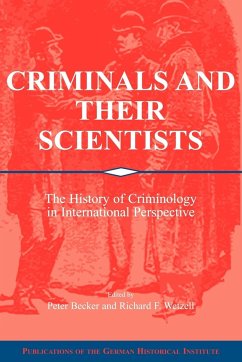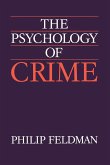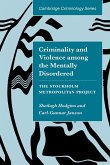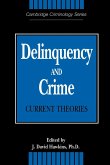Criminals and Their Scientists
The History of Criminology in International Perspective
Herausgeber: Becker, Peter; Peter, Becker; Wetzell, Richard F.
Criminals and Their Scientists
The History of Criminology in International Perspective
Herausgeber: Becker, Peter; Peter, Becker; Wetzell, Richard F.
- Broschiertes Buch
- Merkliste
- Auf die Merkliste
- Bewerten Bewerten
- Teilen
- Produkt teilen
- Produkterinnerung
- Produkterinnerung
A history of criminology as a history of science and practice.
Andere Kunden interessierten sich auch für
![The Psychology of Crime The Psychology of Crime]() Philip FeldmanThe Psychology of Crime63,99 €
Philip FeldmanThe Psychology of Crime63,99 €![Choosing White-Collar Crime Choosing White-Collar Crime]() Neal ShoverChoosing White-Collar Crime43,99 €
Neal ShoverChoosing White-Collar Crime43,99 €![Criminality and Violence Among the Mentally Disordered Criminality and Violence Among the Mentally Disordered]() Sheilagh HodginsCriminality and Violence Among the Mentally Disordered46,99 €
Sheilagh HodginsCriminality and Violence Among the Mentally Disordered46,99 €![Shame Management Through Reintegration Shame Management Through Reintegration]() Eliza AhmedShame Management Through Reintegration58,99 €
Eliza AhmedShame Management Through Reintegration58,99 €![Errors of Justice Errors of Justice]() Brian ForstErrors of Justice43,99 €
Brian ForstErrors of Justice43,99 €![Drug-Crime Connections Drug-Crime Connections]() Trevor BennettDrug-Crime Connections47,99 €
Trevor BennettDrug-Crime Connections47,99 €![Delinquency and Crime Delinquency and Crime]() J. Hawkins (ed.)Delinquency and Crime51,99 €
J. Hawkins (ed.)Delinquency and Crime51,99 €-
-
-
A history of criminology as a history of science and practice.
Hinweis: Dieser Artikel kann nur an eine deutsche Lieferadresse ausgeliefert werden.
Hinweis: Dieser Artikel kann nur an eine deutsche Lieferadresse ausgeliefert werden.
Produktdetails
- Produktdetails
- Verlag: Cambridge University Press
- Seitenzahl: 512
- Erscheinungstermin: 30. Juni 2009
- Englisch
- Abmessung: 229mm x 152mm x 30mm
- Gewicht: 823g
- ISBN-13: 9780521120739
- ISBN-10: 052112073X
- Artikelnr.: 27007628
- Herstellerkennzeichnung
- Libri GmbH
- Europaallee 1
- 36244 Bad Hersfeld
- gpsr@libri.de
- Verlag: Cambridge University Press
- Seitenzahl: 512
- Erscheinungstermin: 30. Juni 2009
- Englisch
- Abmessung: 229mm x 152mm x 30mm
- Gewicht: 823g
- ISBN-13: 9780521120739
- ISBN-10: 052112073X
- Artikelnr.: 27007628
- Herstellerkennzeichnung
- Libri GmbH
- Europaallee 1
- 36244 Bad Hersfeld
- gpsr@libri.de
Part I. Non-academic Sites of Nineteenth-Century Criminological Discourse:
1. The French Revolution and the origins of French criminology Marc
Renneville; 2. Murderers and 'reasonable men': the 'criminology' of the
Victorian Judiciary Martin J. Wiener; 3. Unmasking counterhistory: an
introductory exploration of criminality and the Jewish question Michael
Berkowitz; 4. Moral discourse and reform in urban Germany, 1880s-1914
Andrew Lees; 5. The criminologists' gaze at the underworld: toward an
archaeology of criminological writing Peter Becker; Part II. Criminology as
Scientific and Political Practice in the Late Nineteenth and Early
Twentieth Centuries: 6. Cesare Lombroso and Italian criminology: theory and
politics Mary S. Gibson; 7. Criminal anthropology: its reception in the
United States and the nature of its appeal Nicole Hahn Rafter; 8. From the
'atavistic' to the 'inferior' criminal type: the impact of the Lombrosian
theory of the born criminal on German psychiatry Mariacarla Gadebusch
Bondio; 9. Criminology, hygienism, and eugenics in France, 1870-1914: the
medical debates on the elimination of 'incorrigible' criminals Laurent
Muccielli; 10. Crime, prisons, and psychiatry: reconsidering problem
populations in Australia, 1890-1930 Stephen Garton; 11. Positivist
criminology and state formation in modern Argentina, 1890-1940 Ricardo D.
Salvatore; 12. The birth of criminology in modern Japan Yoji Nakatani; Part
III. The Making of the Criminologist: 13. The international congresses of
criminal anthropology: shaping the French and international criminological
movement, 1886-1914 Martine Kaluszynski; 14. Making criminologists: tools,
techniques, and the production of scientific authority David G. Horn; 15.
'One of the strangest relics of a former state': tattoos and the discourses
of criminality in Europe, 1880-1920 Jane Caplan; 16. What criminals think
about criminology: French criminals and criminological knowledge at the end
of the nineteenth century Philippe Artières; 17. Talk of the town: the
murder of Lucie Berlin and the production of local knowledge Peter
Fritzsche; Part IV. Criminology in the First Half of the Twentieth Century:
The Case of Weimar and Nazi Germany: 18. Criminology in Weimar and Nazi
Germany Richard F. Wetzell; 19. The Biology of mortality: criminal biology
in Bavaria, 1924-33 Oliver Liang; 20. Criminals and their analysts:
psychoanalytic criminology in Weimar Germany and the first Austrian
Republic Gabriel N. Finder; 21. Drinking and crime in modern Germany
Geoffrey J. Giles.
1. The French Revolution and the origins of French criminology Marc
Renneville; 2. Murderers and 'reasonable men': the 'criminology' of the
Victorian Judiciary Martin J. Wiener; 3. Unmasking counterhistory: an
introductory exploration of criminality and the Jewish question Michael
Berkowitz; 4. Moral discourse and reform in urban Germany, 1880s-1914
Andrew Lees; 5. The criminologists' gaze at the underworld: toward an
archaeology of criminological writing Peter Becker; Part II. Criminology as
Scientific and Political Practice in the Late Nineteenth and Early
Twentieth Centuries: 6. Cesare Lombroso and Italian criminology: theory and
politics Mary S. Gibson; 7. Criminal anthropology: its reception in the
United States and the nature of its appeal Nicole Hahn Rafter; 8. From the
'atavistic' to the 'inferior' criminal type: the impact of the Lombrosian
theory of the born criminal on German psychiatry Mariacarla Gadebusch
Bondio; 9. Criminology, hygienism, and eugenics in France, 1870-1914: the
medical debates on the elimination of 'incorrigible' criminals Laurent
Muccielli; 10. Crime, prisons, and psychiatry: reconsidering problem
populations in Australia, 1890-1930 Stephen Garton; 11. Positivist
criminology and state formation in modern Argentina, 1890-1940 Ricardo D.
Salvatore; 12. The birth of criminology in modern Japan Yoji Nakatani; Part
III. The Making of the Criminologist: 13. The international congresses of
criminal anthropology: shaping the French and international criminological
movement, 1886-1914 Martine Kaluszynski; 14. Making criminologists: tools,
techniques, and the production of scientific authority David G. Horn; 15.
'One of the strangest relics of a former state': tattoos and the discourses
of criminality in Europe, 1880-1920 Jane Caplan; 16. What criminals think
about criminology: French criminals and criminological knowledge at the end
of the nineteenth century Philippe Artières; 17. Talk of the town: the
murder of Lucie Berlin and the production of local knowledge Peter
Fritzsche; Part IV. Criminology in the First Half of the Twentieth Century:
The Case of Weimar and Nazi Germany: 18. Criminology in Weimar and Nazi
Germany Richard F. Wetzell; 19. The Biology of mortality: criminal biology
in Bavaria, 1924-33 Oliver Liang; 20. Criminals and their analysts:
psychoanalytic criminology in Weimar Germany and the first Austrian
Republic Gabriel N. Finder; 21. Drinking and crime in modern Germany
Geoffrey J. Giles.
Part I. Non-academic Sites of Nineteenth-Century Criminological Discourse:
1. The French Revolution and the origins of French criminology Marc
Renneville; 2. Murderers and 'reasonable men': the 'criminology' of the
Victorian Judiciary Martin J. Wiener; 3. Unmasking counterhistory: an
introductory exploration of criminality and the Jewish question Michael
Berkowitz; 4. Moral discourse and reform in urban Germany, 1880s-1914
Andrew Lees; 5. The criminologists' gaze at the underworld: toward an
archaeology of criminological writing Peter Becker; Part II. Criminology as
Scientific and Political Practice in the Late Nineteenth and Early
Twentieth Centuries: 6. Cesare Lombroso and Italian criminology: theory and
politics Mary S. Gibson; 7. Criminal anthropology: its reception in the
United States and the nature of its appeal Nicole Hahn Rafter; 8. From the
'atavistic' to the 'inferior' criminal type: the impact of the Lombrosian
theory of the born criminal on German psychiatry Mariacarla Gadebusch
Bondio; 9. Criminology, hygienism, and eugenics in France, 1870-1914: the
medical debates on the elimination of 'incorrigible' criminals Laurent
Muccielli; 10. Crime, prisons, and psychiatry: reconsidering problem
populations in Australia, 1890-1930 Stephen Garton; 11. Positivist
criminology and state formation in modern Argentina, 1890-1940 Ricardo D.
Salvatore; 12. The birth of criminology in modern Japan Yoji Nakatani; Part
III. The Making of the Criminologist: 13. The international congresses of
criminal anthropology: shaping the French and international criminological
movement, 1886-1914 Martine Kaluszynski; 14. Making criminologists: tools,
techniques, and the production of scientific authority David G. Horn; 15.
'One of the strangest relics of a former state': tattoos and the discourses
of criminality in Europe, 1880-1920 Jane Caplan; 16. What criminals think
about criminology: French criminals and criminological knowledge at the end
of the nineteenth century Philippe Artières; 17. Talk of the town: the
murder of Lucie Berlin and the production of local knowledge Peter
Fritzsche; Part IV. Criminology in the First Half of the Twentieth Century:
The Case of Weimar and Nazi Germany: 18. Criminology in Weimar and Nazi
Germany Richard F. Wetzell; 19. The Biology of mortality: criminal biology
in Bavaria, 1924-33 Oliver Liang; 20. Criminals and their analysts:
psychoanalytic criminology in Weimar Germany and the first Austrian
Republic Gabriel N. Finder; 21. Drinking and crime in modern Germany
Geoffrey J. Giles.
1. The French Revolution and the origins of French criminology Marc
Renneville; 2. Murderers and 'reasonable men': the 'criminology' of the
Victorian Judiciary Martin J. Wiener; 3. Unmasking counterhistory: an
introductory exploration of criminality and the Jewish question Michael
Berkowitz; 4. Moral discourse and reform in urban Germany, 1880s-1914
Andrew Lees; 5. The criminologists' gaze at the underworld: toward an
archaeology of criminological writing Peter Becker; Part II. Criminology as
Scientific and Political Practice in the Late Nineteenth and Early
Twentieth Centuries: 6. Cesare Lombroso and Italian criminology: theory and
politics Mary S. Gibson; 7. Criminal anthropology: its reception in the
United States and the nature of its appeal Nicole Hahn Rafter; 8. From the
'atavistic' to the 'inferior' criminal type: the impact of the Lombrosian
theory of the born criminal on German psychiatry Mariacarla Gadebusch
Bondio; 9. Criminology, hygienism, and eugenics in France, 1870-1914: the
medical debates on the elimination of 'incorrigible' criminals Laurent
Muccielli; 10. Crime, prisons, and psychiatry: reconsidering problem
populations in Australia, 1890-1930 Stephen Garton; 11. Positivist
criminology and state formation in modern Argentina, 1890-1940 Ricardo D.
Salvatore; 12. The birth of criminology in modern Japan Yoji Nakatani; Part
III. The Making of the Criminologist: 13. The international congresses of
criminal anthropology: shaping the French and international criminological
movement, 1886-1914 Martine Kaluszynski; 14. Making criminologists: tools,
techniques, and the production of scientific authority David G. Horn; 15.
'One of the strangest relics of a former state': tattoos and the discourses
of criminality in Europe, 1880-1920 Jane Caplan; 16. What criminals think
about criminology: French criminals and criminological knowledge at the end
of the nineteenth century Philippe Artières; 17. Talk of the town: the
murder of Lucie Berlin and the production of local knowledge Peter
Fritzsche; Part IV. Criminology in the First Half of the Twentieth Century:
The Case of Weimar and Nazi Germany: 18. Criminology in Weimar and Nazi
Germany Richard F. Wetzell; 19. The Biology of mortality: criminal biology
in Bavaria, 1924-33 Oliver Liang; 20. Criminals and their analysts:
psychoanalytic criminology in Weimar Germany and the first Austrian
Republic Gabriel N. Finder; 21. Drinking and crime in modern Germany
Geoffrey J. Giles.








